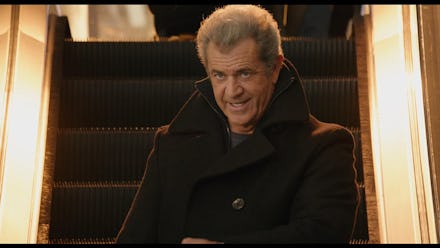In a post-Weinstein world, what is Mel Gibson still doing here?

Midway through the trailer for Daddy’s Home 2, a graying but robust Kurt Mayron, played by Mel Gibson, saunters down an airport escalator toward his son, Dusty (Mark Wahlberg). Dusty, newly evolved as a more sensitive father and husband, is worried the old man’s going to give him grief. Later, Dusty winces when Papa Mayron greets the grandkids by teasing a one-liner about “dead hookers.” The joke, were he allowed to complete it, would have probably, hopefully gone over the kids’ heads.
But what grown-ups in the audience are supposed to connect with, and apparently find funny, is Gibson and the screenwriters sending up his reputation as a ribald crank. Given the 61-year-old actor-director’s public roll call of wrongdoings — including vile anti-Semitic remarks in 2006, tapes of an abusive, racist rant he reportedly leveled at his ex-girlfriend in 2010 and a no-contest plea in a domestic violence case in 2011 — this is a big ask. It’s akin to expecting that moviegoers would pony up for Louis C.K.’s Lolita-ish flick I Love You, Daddy after reading the accounts published in the New York Times from young female comics who said he committed sexual misconduct.
But apparently the gap between Gibson’s publicly documented disgraces and his 2016 Oscar-winning war drama Hacksaw Ridge was de facto time served. So despite the post-Harvey Weinstein talk of tipping points, could Kevin Spacey — freshly scrubbed from Ridley Scott’s All the Money in the World — slink back into frame 10 years from now in some self-aware pose? Will Louis C.K., who fully copped to the accusations in the Times, someday be ushered back on-stage to make dirty jokes about his behavior, as if he were Pee-Wee Herman image-rehabbing after his arrest at an adult movie theater?
It’s not a stretch to think Gibson would no doubt argue, as he did while promoting Hacksaw with what can now reasonably be classified as Trumpian doublespeak, that he’s completed his sentence behind bad-behavior bars. One imagines that, in his pathologically self-pitying stance, he would contest being roped into the raging, industry-wide discussion about male accountability as tantamount to double jeopardy.
Except there is no such protection in the court of public opinion. Gibson — like the aforementioned names in this piece, even potentially including Mad Men creator Matthew Weiner, who’s been accused of Don Draper-esque sexual harassment of a female colleague — rolled the dice that his goodwill casts a longer shadow than any indecency. He gambled on the fact that he was resurfacing in a culture that remained fundamentally unchanged in its idolatry of influential men. (See: a 2016 interview with Stephen Colbert in which the Passion of the Christ director appeared to figure that some signature charisma and a kindly beard would elicit Jesuit-like forgiveness.)
But on the weekend that Daddy’s Home 2 hits theaters, Gibson ought to be on pins and needles. The latest phase in his comeback has all but made him a moving target for further character assassination. There’s nothing to suggest he’s ever made the specific sorts of unwanted advances on women that have felled so many in recent weeks. But if he’s been burying any more skeletons beyond the ones that have already been exposed to the public, then the sight of his grinning maw across multiplex screens likely only heightens the possibility of them being exhumed.
Beyond boycotting Daddy’s Home 2 — which should be a no-brainer based on objective standards of taste — or waiting for Gibson to escape his daring reentry into our orbit further scathed, maybe his best and only function is as some kind of monumental nod to our precedent of pardoning icons and idols for flagrant acts that would devastate anyone else for good. (It should be noted that Gibson’s Daddy’s Home 2 co-star Wahlberg literally sought pardon — the petition for which was eventually dropped — for a 1988 assault conviction.)
Because as long as Gibson can co-star in 2017’s “perfect family comedy” playing perversely to type, there’s no reason to expect that, say, James Toback will be denied a chance to meta-confess his alleged sins in a Sundance-shopped documentary. And maybe, in turn, an upcoming generation of ambitious male auteurs will feel duly beyond reproach.
The reckoning that began with Rose McGowan and others cutting Weinstein down to size has been both riveting and revolting. Gibson surely isn’t alone in roaming conspicuously free, career practically revived. But he is, in many ways, the baseline standard of measurement for who deserves to be banished. So if this revolution is going to stick, and if the tide really has turned, Mel Gibson — entertainment’s ultimate unmasked menace — must be washed out to sea.